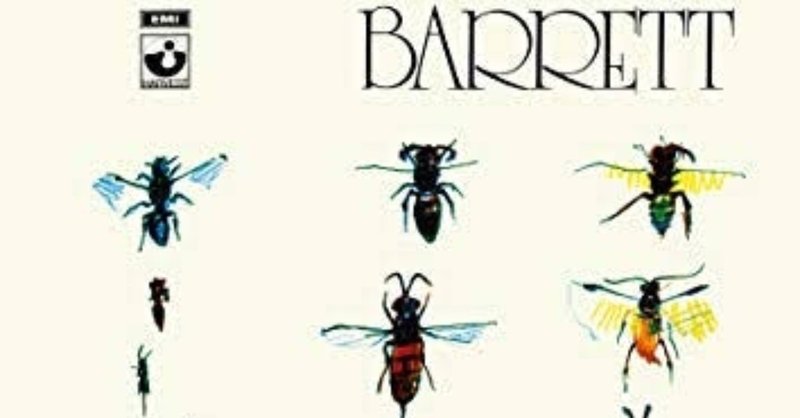
シド・バレット伝 二
Solo Years(1968 - 1972)
ソロ活動
After leaving Pink Floyd, Barrett was out of the public eye for a year.[89] Then, in 1969, at the behest of EMI and Harvest Records, he embarked on a brief solo career, releasing two solo albums, The Madcap Laughs and Barrett (both 1970), and a single, "Octopus". Some songs, "Terrapin", "Maisie" and "Bob Dylan Blues", reflected Barrett's early interest in the blues.[90]
ピンク・フロイドを離れたあと、バレットは一年間公の前に姿を現さなかった。それから1969年になり、EMIとハーヴェストレコードから要請があって、彼はしばらくのソロキャリアに乗り出し、二枚のソロアルバム『The Madcap Laughs』『バレット』、それから一枚のシングル『オクトパス』をリリースした。「キスイカメ」「メイジー」「ボブ・ディラン・ブルース」などのいくつかの曲では、バレットが初期に関心を持ったブルースミュージックが反映されている。
『The Madcap Laughs』
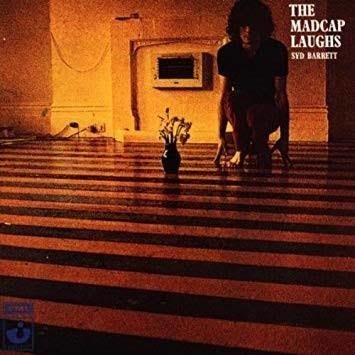
After Barrett left Pink Floyd, Jenner followed suit. He led Barrett into EMI Studios to record some tracks[91] in May that would later be released on Barrett's first solo album, The Madcap Laughs. However, Jenner said: "I had seriously underestimated the difficulties of working with him".[92] By the sessions of June and July, most of the tracks were in better shape; however, shortly after the July sessions, Barrett broke up with girlfriend Lindsay Corner and went on a drive around Britain in his Mini, ending up in psychiatric care in Cambridge.[93] During New Year 1969, a somewhat recovered Barrett had taken up tenancy in a flat on Egerton Gardens, South Kensington, London, with the Post Modernist artist Duggie Fields.
バレットがピンク・フロイドを離れたあと、ジェナーは後に続いた。彼はバレットを引き連れEMIスタジオに入り五月、いくつかの曲をレコーディングした。のちにバレットのファーストソロアルバム『The Madcap Laughs』として発表される曲である。しかしながら、ジェナー曰く「わたしは彼との仕事の困難さにどう考えても過小評価するしかありませんでした。」六月と七月のセッションにより、トラックのほとんどは良い出来にはなったが、七月のセッションのあとは短く、バレットはガールフレンドだったリンゼイ・コーナーと別れるとひとりでイギリス中をドライブに行ってしまい、終わる頃にはケンブリッジの精神病院にいた。1969年から新年の間にいくぶんか回復したバレットはポストモダンアーティストのダギー・フィールズといっしょに、ロンドン、サウスケンジントンにあるエガートン・ガーデンのアパートを借りた。
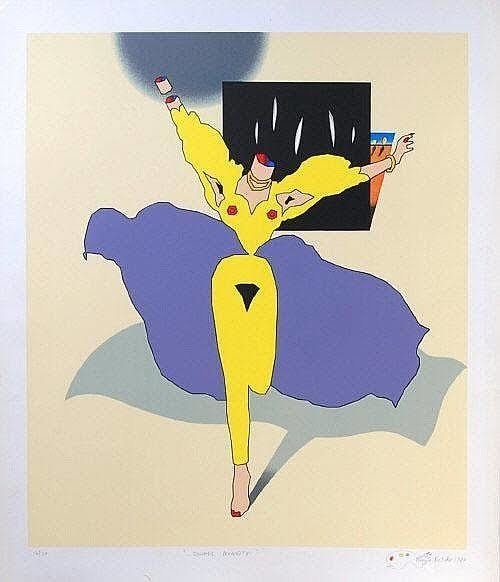
バレットと住んでいたダギー・フィールズの絵。
[93][94] Here, Barrett's flat was so close to Gilmour's that Gilmour could look right into Barrett's kitchen.[93] Deciding to return to music, Barrett contacted EMI and was passed to Malcolm Jones, the then-head of EMI's new prog rock label, Harvest[91] (after Norman Smith[95] and Jenner declined to produce Barrett's record,[95] Jones produced it).[93][95] Barrett wanted to recover the Jenner-produced sessions recordings; several of the tracks were improved upon.[96]
どうやら、バレットのアパートはギルモアの家のすぐ近くにあったようで、ギルモアがのぞけばバレットの家のキッチンが見えた。音楽へ再起することを決意し、バレットはEMIを通してマルコム・ジョーンズと連絡を取った。彼はEMIの新しいプログレレーベル、ハーヴェストのリーダーだった(ノーマンスミスとジェナーがバレットのレコードのプロデューサーを辞退したあとは、ジョーンズがプロデュースすることになった)。バレットはジェナーのプロデュースするセッションレコーディングで立ち直ろうとした。トラックのいくつかは改良を加えられた。
The Jones-produced sessions started in April 1969 at EMI Studios. After the first of these sessions, Barrett brought in friends to help out: Humble Pie drummer Jerry Shirley, and Jokers Wild (Gilmour's old band) drummer Willie Wilson. For the sessions, Gilmour played bass. Talking to Barrett wasn't easy, said Jones: "It was a case of following him, not playing with him. They were seeing and then playing so they were always a note behind".[93] A few tracks on the album feature overdubs by members of the band Soft Machine.[54] During this time, Barrett also played guitar on the sessions for Soft Machine founder Kevin Ayers' debut LP Joy of a Toy,[97] although his performance on "Religious Experience" (later titled "Singing a Song in the Morning") was not released until the album was reissued in 2003.[54][98]
ジョーンズの指揮するセッションは1969年4月EMIスタジオで始められた。最初のセッションが終わったあとでバレットはヘルプとして友人を呼んだ。ハンブル・パイのドラマーのジェリー・シェリー、ジョーカーズ・ワイルド(ギルモアが昔在籍していたバンド)のドラマーのウィリーウィルソン。セッションではギルモアはベースを弾いた。バレットと演奏するのは容易じゃないと話していた。ジョーンズ曰く「彼についていくように演奏しているからだった、彼に合わせなくてよかった。彼らは目を合わせて、それから演奏するのでいつも音が遅れてズレた。」ソフト・マシーンのメンバーたちがこのアルバムのいくつかの曲で音を重ねて録音した。このあいだにバレットもまた、ソフトマシーンの創始者であるケヴィン・エアーズのデビューソロアルバムにギターを演奏したが、にもかかわらず彼の「宗教体験的」と思えるその演奏(のちに「シンギング・ア・ソング・イン・ザ・モーニング」と名付けられる」は2003年にアルバムがリイシューされるまでは発表されなかった。
One time, Barrett had told his flatmate that he was going off "for an afternoon drive". However, he followed Pink Floyd to Ibiza (according to legend, he skipped check-ins and customs, ran onto the runway and attempted to flag down a jet). One of his friends, J. Ryan Eaves, bass player for the short-lived but influential Manchester band York's Ensemble, later spotted him on a beach wearing messed-up clothes and with a carrier bag full of money. By this point, during the trip, Barrett had asked Gilmour for his help in the recording sessions.[93]
After two of the Gilmour/Waters-produced sessions,[99] they remade one track from the Soft Machine overdubs and recorded three tracks.
一度、バレットは「遠くまで午後のドライブ」に行かないかとルームメイトに言われた。しかしながら、彼はピンク・フロイドのメンバーとイビザ島についていった(伝説によると、彼はスキップして搭乗手続きを済ませ、滑走路からジェット機の停止信号まで走ろうとした。)彼の友達の一人であるJ ライアン・イーブス(少しの間人気のあったヨークス・エンセンブルというマンチェスターのバンドのベーシスト)が遅れて浜辺の彼のもとに着いたとき、彼は水着をめちゃくちゃに着てキャリーバッグにはお金がたくさん詰め込まれていた。この旅行のあいだに、バレットはギルモアにレコーディングセッションのヘルプで演奏してくれないかと尋ねた。そのあとギルモアとウォーターズの二人がプロデューサーとなったセッションが始められ、彼らはソフトマシーンが重ねて録音した曲のうちの一曲を作り直し、三曲をレコーディングした。
These sessions came to a minor halt when Gilmour and Waters were mixing Pink Floyd's newly recorded album, Ummagumma, to Barrett's dismay. However, through the end of July, they managed to record three more tracks. The problem with the recording was that the songs were recorded as Barrett played them "live" in studio. On the released versions a number of them have false starts and commentaries from Barrett.[93] Despite the track being closer to complete and better produced, Gilmour and Waters left the Jones-produced track "Opel" off Madcap.[100]
このセッションはギルモアとウォーターズがピンクフロイドの新しいアルバム『ウマグマ』の制作を始めていたこととバレットの気のふれた振る舞いとが混ざり合い、しばし停滞した。しかしながら、七月の終わり、彼らは三曲のレコーディングを手がけた。レコーディングの問題点は、楽曲がバレットのスタジオでの「ライヴ」演奏によって録音されたことだ。リリースされた楽曲のテイクは始まりを間違っていたり、バレットによる実況が入っていた。そのようなトラックにもかかわらず締め切りは迫っており、よりよく仕上げなければならず、ギルモアとウォーターズはジョーンズがプロデュースしていた「オペル」という曲を『The Madcap Laughs』から外した。
♪No Good Trying
Gilmour later said of the sessions for The Madcap Laughs:
ギルモアはのちにこの時のセッションのことをこう振り返る。
[Sessions] were pretty tortuous and very rushed. We had very little time, particularly with The Madcap Laughs. Syd was very difficult, we got that very frustrated feeling: Look, it's your fucking career, mate. Why don't you get your finger out and do something? The guy was in trouble, and was a close friend for many years before then, so it really was the least one could do.[101]
セッションはひどく曲がりくねりながらとんでもない突貫工事だった。僕らはちょっとでも時間があると、特段The Madcap Laughsに費やした。シドはとても難しく、僕らはとんでもなくイライラした。見ろ、おまえのそのクソッタレな経歴に、仲間たち。どうしておまえは自分の指を出してどうにかしないんだ?アイツはトラブルの中にあって、誰よりもたくさんの時間を過ごしてきた親友だったし、本当なら少なくともどうにかできたはずだった。
Upon the album's release in January 1970, Malcolm Jones was shocked by the substandard musicianship on the Gilmour and Waters-produced songs: "I felt angry. It's like dirty linen in public and very unnecessary and unkind". Gilmour said: "Perhaps we were trying to show what Syd was really like. But perhaps we were trying to punish him". Waters was more positive: "Syd is a genius".[102]
Barrett said "It's quite nice but I'd be very surprised if it did anything if I were to drop dead. I don't think it would stand as my last statement."[102]
Evelyn "Iggy the Eskimo" Rose (1947 - 2017) appeared nude on the back of the album's inner sleeve.[103]
1970年1月にアルバムが発売される前、マルコム・ジョーンズはギルモアとウォーターズのあまりに低水準の音楽的才能によってプロデュースされた楽曲にショックを受けた。「わたしは怒りを感じました。これでは人前に汚れた下着で出るようなもので、とても不必要で、不親切だと思いました。」ギルモア曰く、「おそらく、僕らはシドが本当に好きなやり方を試みた。でももしかしたら、僕らは彼を懲らしめることになったかもしれない。」ウォーターズはとても前向きだった。「シドは、天才だ。」
バレット曰く、「かなり良いが、もしおれがのたれ死にするならなんでもしただろうとかなり驚かされたよ。おれの最期の声明としてはそぐわないと思う。」
エヴェリン “イギー・ザ・エスキモー” ローズ(1947 - 2017)はアルバムのインナースリーブで後ろ姿のヌードを披露している。
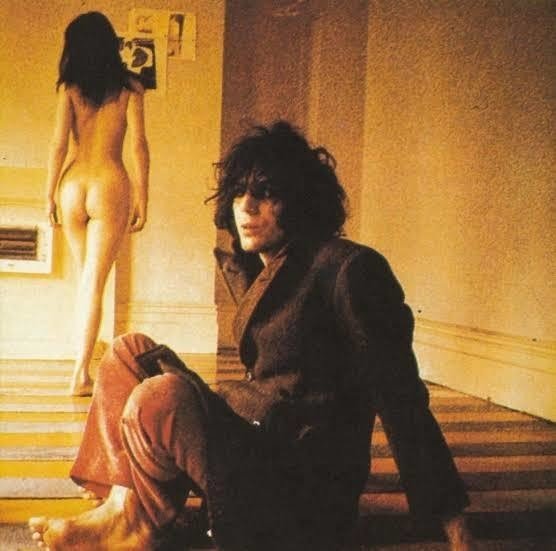
『バレット』
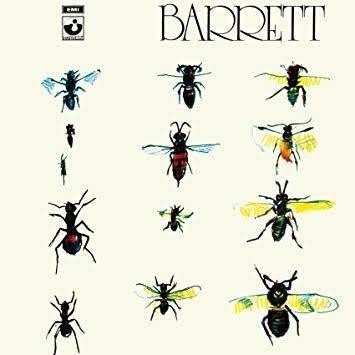
The second album, Barrett, was recorded more sporadically than the first,[104] with sessions taking place between February and July 1970.[102][105] The album was produced by David Gilmour,[102][106] and featured Gilmour on bass guitar, Richard Wright on keyboard and Humble Pie drummer Jerry Shirley.
セカンドアルバム『バレット』は『The Madcap Laughs』よりさらに散発的にレコーディングのされ、セッションは1970年の2月から7月までの間で場所を変えて行われた。このアルバムはデビッド・ギルモアによってプロデュースされ、またベースギターもギルモアが担当し、キーボードにリチャード・ライト、ドラマーにハンブル・パイのジェリー・シェリーが担当した。
The first two songs attempted were for Barrett to play and/or sing to an existing backing track. However, Gilmour thought they were losing the "Barrett-ness". One track ("Rats") was originally recorded with Barrett on his own. That would later be overdubbed by musicians, despite the changing tempos. Shirley said of Barrett's playing: "He would never play the same tune twice. Sometimes Syd couldn't play anything that made sense; other times what he'd play was absolute magic.”
まずはじめに、二つの楽曲ではバレットがあらかじめ録られた伴奏にあわせて演奏、または歌唱することが試みられた。しかしながら、ギルモアはメンバーが「バレットなし」では失敗すると考えた。あるトラック(”ラッツ”)はバレット本来の持ち味で録音された。テンポは変わっていくにかかわらず、メンバーはあとから音を重ねた。ドラムのジェリーはバレットの演奏についてこう言った。「彼はぜったいに二回と同じ演奏をしないだろう。ときどきシドは意味をなした演奏ができなかった。また他のときには彼の演奏は純然たる魔法だった。」
At times Barrett, who experienced synaesthesia,[4] would say: "Perhaps we could make the middle darker and maybe the end a bit middle afternoonish. At the moment it's too windy and icy".[102]
These sessions were happening while Pink Floyd had just begun to work on Atom Heart Mother. On various occasions, Barrett went to "spy" on the band as they recorded their album.[102]
共感覚を持つバレットはたまに言った「おそらくおれたちは中間の暗さか、或いは少し日の落ちかけたまんなかの昼過ぎっぽい感じが表現できるだろう。今のところはかなり風が強くて冷たいけど」。
これらのセッションは、『原子心母』の制作に取り掛かろうとし始めたピンクフロイドにとってはやっかいだった。いろいろな機会で、バレットはピンクフロイドのレコーディング現場に「スパイ行為」を働きに行った。
Wright said of the Barrett sessions:
ライトは『バレット』でのセッションについてこう話す。
Doing Syd's record was interesting, but extremely difficult. Dave [Gilmour] and Roger did the first one (The Madcap Laughs) and Dave and myself did the second one. But by then it was just trying to help Syd any way we could, rather than worrying about getting the best guitar sound. You could forget about that! It was just going into the studio and trying to get him to sing.
シドのレコーディングは興味深いものだったが、極めて困難なものだった。ギルモアとウォーターズは1枚目『The Madcap Laughs』に参加し、僕とギルモアは2枚目も手がけた。でもそれはただシドを僕らがどうにかこうにか助けるだとか、最高のギターサウンドを手に入れるためだとかそういうわけでない。あんなことを忘れられるだろうか!ただスタジオに行って彼の歌をつかみ取ろうとするんだ。
♪Dominoes
パフォーマンス
Despite the numerous recording dates for his solo albums, Barrett undertook very little musical activity between 1968 and 1972 outside the studio. On 24 February 1970, he appeared on John Peel's BBC radio programme Top Gear[102][108] playing five songs—only one of which had been previously released. Three would be re-recorded for the Barrett album, while the song "Two of a Kind" was a one-off performance (possibly written by Richard Wright).[nb 8] Barrett was accompanied on this session by Gilmour and Shirley who played bass and percussion,[102] respectively.[nb 9]
ソロアルバムのために数々のレコーディングの日々を費やしたにもかかわらず、バレットが1968年から1972年の間でスタジオの外で音楽活動を行ったのはきわめて少ない。1970年2月24日、ジョン・ピールのBBCラジオプログラム「トップ・ギア」に出演して5曲を披露した -そのうちの1曲だけがすでに発表された曲だった。3曲は改めて録音し直され『バレット』に収録され、あとの1曲「トゥー・オブ・ア・カインド」はこの一度きりのパフォーマンスだった(おそらく、リチャード・ライトが書いた曲である)。バレットはこのセッションにベースとパーカッションを担当したギルモアとシェリーをそれぞれ同伴した。
Gilmour and Shirley also backed Barrett for his one and only live concert during this period.[106] The gig took place on 6 June 1970 at the Olympia Exhibition Hall as part of a Music and Fashion Festival.[111] The trio performed four songs,[106] "Terrapin", "Gigolo Aunt", "Effervescing Elephant" and "Octopus". Poor mixing left the vocals barely audible until part-way through the last number.[111] At the end of the fourth song, Barrett unexpectedly but politely put down his guitar and walked off the stage.[106]
ギルモアとシェリーもまた、バレットのたった唯一のソロライブ中に彼の後ろで演奏することを見限った。そのギグは、1970年6月6日オリンピア・エキシビジョン・ホール「音楽とファッションの祭典」でのことだった。3人は「キスイカメ」「ジゴロおばさん」「興奮した象」「オクトパス」の4曲を演奏した。バレットは不意に、しかし礼儀正しくギターを置くとステージを降りてしまった。
The performance has been bootlegged.[111][112] Barrett made one last appearance on BBC Radio, recording three songs at their studios on 16 February 1971.[nb 10] All three came from the Barrett album. After this session, he took a hiatus from his music career that lasted more than a year, although in an extensive interview with Mick Rock and Rolling Stone in December, he discussed himself at length, showed off his new 12-string guitar, talked about touring with Jimi Hendrix and stated that he was frustrated in terms of his musical work because of his inability to find anyone good to play with.[113]
そのパフォーマンスはブートレッグとして出回っている。バレットの最期の出演はBBCラジオであり、1971年2月16日に番組のスタジオで3曲を録音した。その3曲はすべて『バレット』に収録されている。このセッションのあと彼は、自身の音楽経歴において1年以上休み続けたが、12月ローリングストーンズ誌からミックロックによる広範囲にわたるインタビューが行われた。彼は休止中の自身について話し、新しい12弦ギターを見せびらかし、彼は彼と一緒に演奏するにふさわしい人材がいないことから自身のミュージックワークについての鬱憤を述べ、ジミ・ヘンドリックスといっしょにツアーをまわることついて話した。
この記事が気に入ったらサポートをしてみませんか?
